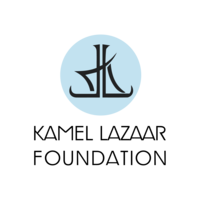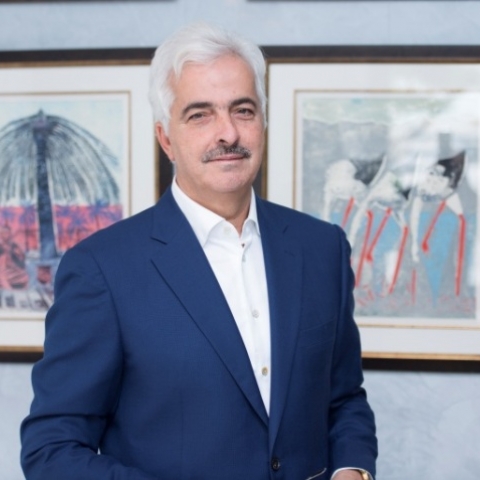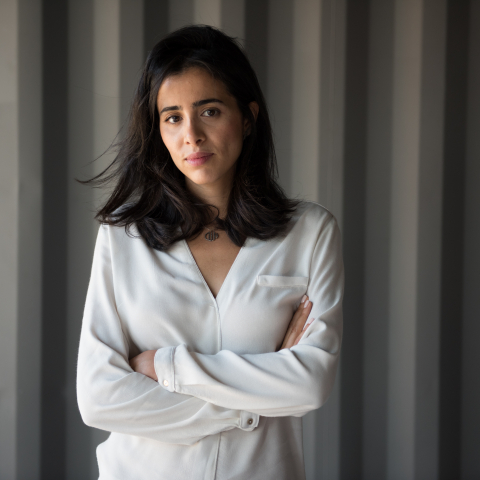OUR AREAS OF WORK : CONTEMPORARY VISUAL ART • HERITAGE • EDUCATION
WHAT WE DO : COLLECT • CURATE • PRODUCE • PRESERVE • INITIATE
About us
Since its founding in 2005, the Kamel Lazaar Foundation for Art and Culture has launched several actions and projects whose local and regional effects highlight the vitality and diversity of the cultural scene in the MENA region. The Foundation supports research, publication and exhibition initiatives, and regularly organizes debates, symposiums and seminars. It supports the production and accompaniment of artists through residencies and artists' workshops, and develops partnerships and exchanges with international cultural actors, in order to promote Tunisia as a hub for contemporary art.
One of the pillars of KLF is its collection of contemporary art which includes more than 1200 works (paintings, sculptures, photographs, drawings, installations...) mixing young artists and internationally renowned artists such as Mounir Fatmi, Abdelaziz Gorgi, Nabil Youssef, Mona Hatoum, or Kader Attia. It is part of the most important collections in North Africa and the Arab world. Giving the general public the opportunity to see this collection and creating connections between the artists in it are the driving forces behind the Foundation's activities. Thus, in 2011, KLF inaugurated the Ibraaz online platform, a leading forum for exchange and critical reflection on the visual arts in the MENA region where it is possible to view a large number of works from the Collection. In 2015, the first edition of Jaou will bring together artists, gallery owners, thinkers and actors of change to promote intercultural dialogue and foster exchanges on contemporary creative practices in the Arab world. This biennial will be "exported" in 2017 to the Venice Biennale to highlight artists but also the issues of our regions. Curator of the Tunisian pavilion entitled "The Absence of Path", the Foundation has enabled Tunisia to return to the Venice Biennale after nearly six decades of absence.
Since 2018, in partnership with the Ministry of Education, the Zukunftslabor, the German Ministry of Foreign Affairs, the DDKB (Die deutsche Kammer Philharmonie Bremen) and the Tunisian National Orchestra (ONT), the Foundation has been running an educational project through music at the Ibn Khaldun de la Manouba College: Future Lab Tunisia (FLT).
In 2019, the Foundation creates the B7L9, the first independent art station located in a semi-rural, semi-industrial area in the suburbs of Tunis, which offers a full annual programme of artistic and cultural events accessible free of charge to all.
Finally, to highlight the artistic vitality of the MENA region and create a new history of art, the Foundation offers specialized publications: Artists of Tunisia (2019), Dissonant Archives: Contemporary Visual Culture and Contested Narratives in the Middle East (2015), Uncommon Grounds: New Media and Critical Practices in North Africa and the Middle East (2014) and The Future of a Promise: Contemporary Art from the Arab World (2011)...
Our Missions & Objectives
Cultural rights have been recognized as part of the fundamental rights. While this is the case in the West, the same cannot be said of the MENA region and Africa. KLF's missions aim not only to make our countries recognize that culture is a right because it is a factor of human perfection and development, but also that it promotes intercultural dialogue and has an important role to play in a climate of conflict of civilizations, both domestically, i.e. to make our continent aware of its richness and differences, but also to show the rest of the world the cultural, artistic and intellectual plurality and vitality of our regions, in order to fight against stereotypes. To do this, we must develop, strengthen, and perpetuate a diversified artistic and cultural offer, showcase it within our continent and beyond its borders, and promote access to culture for the greatest number of people on our very territory, namely in Tunis.
Since the revolution of 2011, Tunisia has changed and is in a position to occupy a major place between the Arab world, Africa and the Mediterranean basin. Strategically placed and rich with a millennial plural culture, Tunisia, open to the worlds that surround it, is able to become the missing link between north and south, the link between the Mediterranean, the Arab world and Africa. In fact, in just a few years, Tunisia has established itself as a unique space of crossroads and freedom. We want to strengthen Tunisia's place and role by activating an interregional and international dialogue based on the local and the real and a local dialogue nourished by reflections and a global artistic and intellectual context.
We want to take advantage of this incredible situation to reflect and implement a postcolonial regional discourse, to rewrite an art history that gives back its place to the different localities, to create bridges and parallels between the different schools and artistic movements that are no longer exclusively articulated around the history of Western art.
It is therefore a question, in concrete terms, of making politicians and citizens aware of these issues, highlighting the artistic, cultural and intellectual plurality of our regions, promoting intercultural dialogue by all means, democratising art in general, and the visual arts in particular, essentially in Tunisia and the MENA region with an opening to sub-Saharan Africa and the Mediterranean through the following actions:
- The constitution then the promotion of an art collection highlighting the artistic richness and plurality of MENA artists with the aim of opening real contemporary art spaces on our territories and virtual ones outside the borders, accessible to all, while developing an emulation in the artistic production in the region.
- The development of philanthropic activities to support artists, artistic events and cultural projects.
- The organization of cultural and artistic events with the aim of promoting art and artists in and from the MENA region so that it can radiate beyond our borders.
- The production of knowledge and support for research on artistic and visual culture in order to write a new history of art.
- The creation of a cultural and artistic dynamic through debates, meetings and exchange platforms on visual arts in the region and beyond.
- The development of international partnerships allowing constructive exchanges between Tunisian / MENA / African and Mediterranean / European artists.
- Initiation of educational art projects to develop the sensibility and fulfilment of children and young people.
- The preservation of tangible and intangible heritage
- The publication of works to highlight innovative cultural actions and to offer an international influence to artists, thinkers, curators, intellectuals... of our countries.


